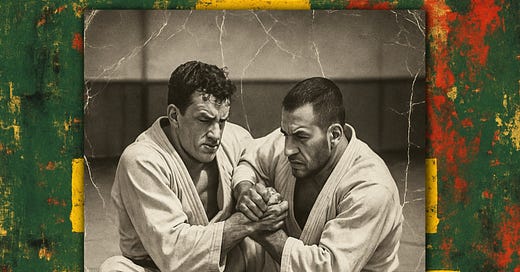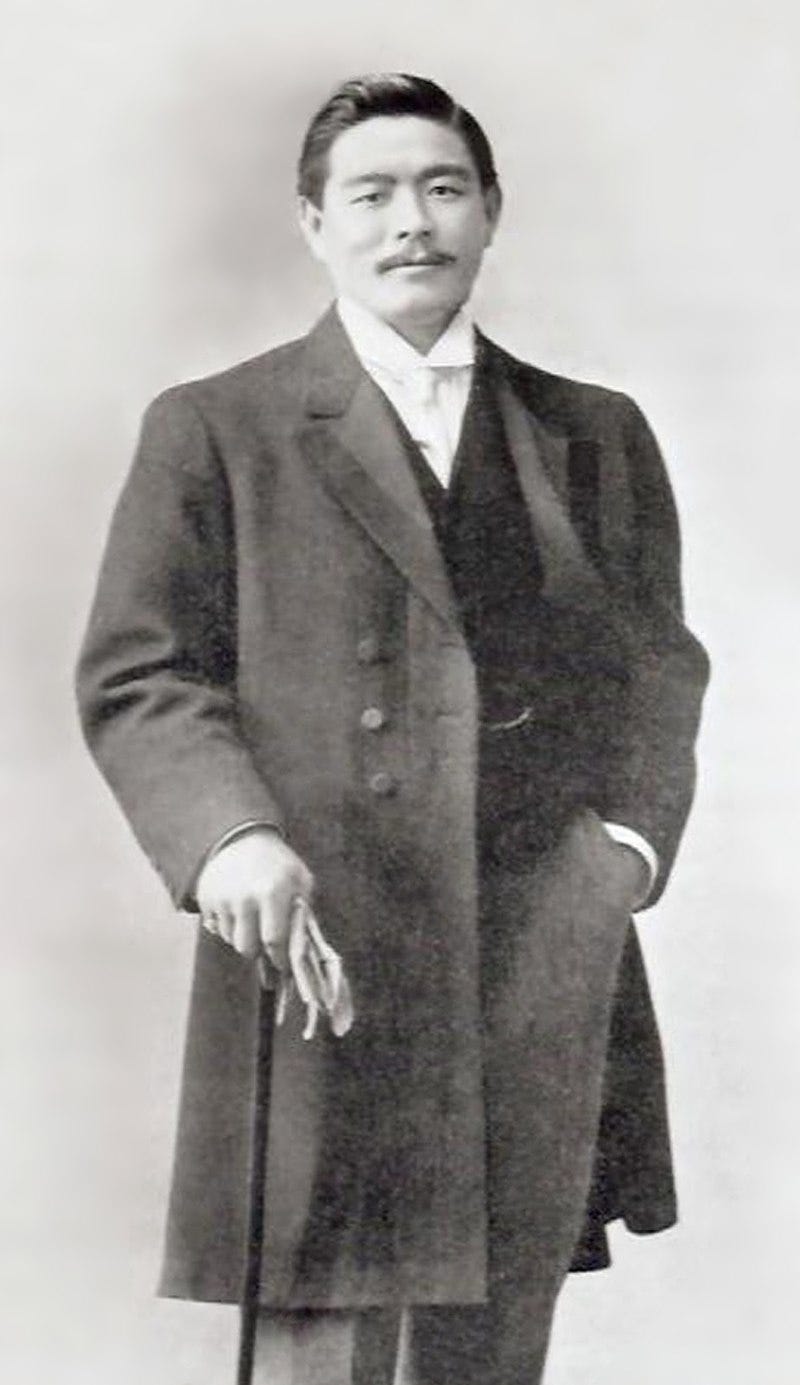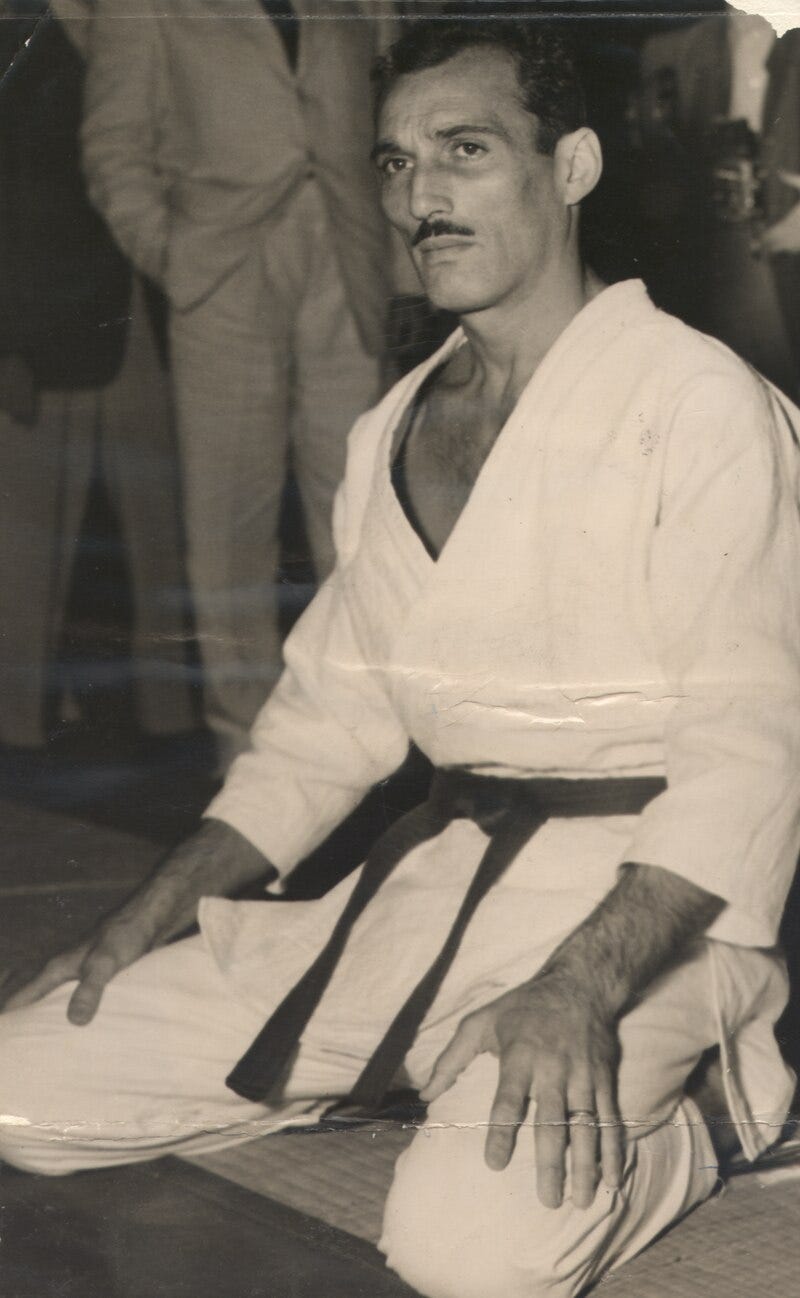Still looking at the three-generation rule I want to carousel through other family dynasties.
In this third piece, I will look at:
Gracie Jiu-Jitsu.
I always liked the simple historical fact that the Gracie’s originally came from Scotland. It made me think of ‘The Clans of the Highlands’, you couldn’t get more tribal than that.1
In reading around the subject (another one which I have zero practical experience of) I found myself going down a whole Brazilian rabbit hole, and really had to discipline myself to stick with the ‘three-generation rule’.
This is going to be a lightning tour and I do hope the GJJ and the Brazilian Jiu-Jitsu community will forgive me.
First impressions: the Gracie family really do go for huge families (yet the ‘Mrs Gracie’s’ never seem to get a mention. They must have been heroes in themselves. Incidentally, Carlos Gracie is said to have fathered 21 children, most of them became black belts in Jiu-Jitsu; I wonder if that’s some kind of record?).
So, this leads me to the second observation; patriarchal family structures. I would posit that this particular dynamic promotes a strong brand of masculine-based family loyalty and pride, a distinct kind of energy. Possibly here we see some of the ingredients for success.
Gracie’s triumphant.
I found myself looking for some references on a kind of Gracie family business model. What did the clan get right? Before I fully get into the whole brand identity thing, let me dip into the origins story.
Early decades of the 20th century. The Gracie family have already worked to develop an entrepreneurial spirit; but this needs a little background.
The beginnings.
It all really starts with a Brazilian chance encounter for one of the early family patriarchs, Gastão Gracie, who in 1916 went into the circus business and came across a Japanese ex-pat called Maeda Mitsuyo who used to be a rising judo star in Kano’s Kodokan from 1895 to 1904. In that same year, 1916, Maeda travel to the Americas and barnstormed his way through open fighting circuits all the way through to his arrival in Brazil. Read up on Maeda’s life; it’s a hell of a story.
Maeda Mitsuyo in 1910.
Credit: Public domain.
https://en.wikipedia.org/wiki/Mitsuyo_Maeda
First generation.
As I understand it, Gastão Gracie did not train under Maeda, but two of his sons did; the elder, Carlos Gracie and younger brother Helio. Both of these are generally considered as first generation of what was to become Gracie Jiu-Jitsu.
This was the founding of the generations.
The impression I get is that this form of fighting, so far removed from Japan, does not deserve the name its detractors give it, i.e. ‘Pseudo-judo’. It has Japanese origins but developed its own distinct identity that suited the environment it was later to flourish in.
Some people say that the Gracie/Maeda style came out of a Kodokan project intended to break the ground impasse; hence the emphasis on the ground game. I am not qualified to comment, but it sort of makes sense.
Here is a short documentary explaining Helio Gracie’s challenge match against Kimura Masihiko in 1951 (narrated by Rener Gracie).
Cultural mix.
Already in South America there was a culture of competitive, money-based no-holds-barred fighting. This was a beefed-up version of what might have been happening in North America, but with added Macho. Vale Tudo (a Portuguese word meaning, ‘anything goes’) was arguably the forerunner of the idea of MMA, but with far less rules. It had a real appeal to it with no restrictions and no interference; it was just what hot-blooded young guys were drawn towards. I cannot think of any equivalent in Europe; it was a uniquely New World thing.
Helio Gracie in 1953. Credit: Public Domain.
The Gracie project unfolded in the right place and in the right era; by the time the second generation rose and point-man Royce Gracie was put out front on the newest, boldest initiative the family had dreamt up, the Ultimate Fighting Challenge; this was how they were able to get their heads above the crowd. World domination looked like a real possibility.
Whatever you think about that first UFC (1993) and Royce Gracie as the winner, it was a key point. Although, to be even-handed criticism has emerged about how the Gracie’s may have loaded the dice. For balance, watch this interview between Jesse Enkamp and Bill Wallace, where Wallace explains where he thinks the Gracie’s pulled the rug, and he should know, he was there.
Royce Gracie, as second generation, was one of Helio’s nine children. Just on a numbers game, the inheritors of the system were widely spread for a family-held franchise to develop – and it did. Based on the three-generation rule, it could have fragmented, but, at that point, this was a strength, not a weakness.
Business and legacy.
The business decision that came out of that is an interesting one. The Gracie’s wanted to control the brand name; didn’t like the idea of others using it. An online discussion I came across suggested that this was both a good move and a bad move.
A good move from a business perspective, but a bad move for the Gracie legacy.
To quote from the discussion, “…if there is a dip in Gracie’s who are highly relevant, then their direct involvement will start to get washed by history”.
‘Washed by history’ is an interesting phrase. Pertinent to the decline of the generations; would it be fair to say that the Angelo’s in the UK were ‘washed by history’? Or that the Yang’s in China, Shanghai and Hong Kong are in the process of being ‘washed by history’?
Maybe, family member or not, the further from the source the generations run, the more they become, not so much washed by history but wrung out and strung out?
The above quotation uses another interesting phrase, suggesting that the descendants may well cease to be ‘highly relevant’. Without a doubt, in terms of reputation and legacy, Royce Gracie was indeed very ‘relevant’.
In conclusion.
I would add to that, that the continued presence of the ghost of the first-generation founder, becomes both a blessing and the monkey on the back of the later generations. As indeed it was with the shades of Domenico Angelo and Yang Lu-ch’an.
To emphasise the argument of a separation between brand name and legacy, I would say that most of us now are quite happy talking about BJJ; ‘Brazilian’ Jiu-Jitsu but I don’t really hear references to GJJ very much (although the Gracie’s seem okay about branch/franchise operations).
Let me plant this seed here and now.
There may well be generational inheritors, who might benefit from looking through the wrong end of the telescope. What is it they say about history? “Those who don't know history are destined to repeat it.”
I will say more about this in a future piece on this theme.
Gracie’s were originally from Paisley, seven miles from Glasgow.







Wow so cool to learn of family / clans and legacy in jiu jitsu. Have you written more on modern martial arts clans?